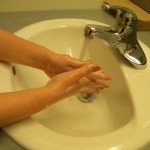Normal
0
false
false
false
EN-US
X-NONE
X-NONE
/* Style Definitions */
table.MsoNormalTable
{mso-style-name:”Table Normal”;
mso-tstyle-rowband-size:0;
mso-tstyle-colband-size:0;
mso-style-noshow:yes;
mso-style-priority:99;
mso-style-parent:””;
mso-padding-alt:0in 5.4pt 0in 5.4pt;
mso-para-margin:0in;
mso-para-margin-bottom:.0001pt;
mso-pagination:widow-orphan;
font-size:11.0pt;
font-family:”Calibri”,”sans-serif”;
mso-ascii-font-family:Calibri;
mso-ascii-theme-font:minor-latin;
mso-hansi-font-family:Calibri;
mso-hansi-theme-font:minor-latin;}
It seems like such a simple solution. Wash your hands to keep yourself well during this cold and flu season. Unfortunately, even though most people know how important hand washing is, many still don’t follow important hygiene procedures. What do we need to do – and teach our kids to do – to stay well this fall and winter? The answer is: wash frequently and correctly.
Our bodies are covered with bacteria. Some cause disease, while others are actually helpful. Some stay on our skin all the time, while we pick up others through contact with objects such as doorknobs, handles, keyboards, and phones. Those “transient” bacteria and viruses that we pick up can live up to five hours on dry surfaces. Touch your cell phone or scratch an itchy eye and they’re now living in your body!
A study conducted by Russell Research for the American Cleaning Institute® (www.cleaninginstitute.org) found that, even though an overwhelming 97% of parents and children agree that hand washing is one of the most important things they can do to keep from getting sick, they don’t always follow through on that belief. At home, only 66% of parents say they have taught their children to spend 20 seconds washing their hands and a full 33% of parents admitted to not always washing their own hands after leaving the restroom. While many parents have discussed the importance of hand washing with children, the research indicates that they must lead by example and prompt kids every day if the message is going to stick.
The way you wash your hands is just as important as the fact that you wash them at all. Just rinsing them for a couple of seconds and then drying them off helps very little. Soap is important to break up grease and dirt, which can hide thousands of germs. Antibacterial soap isn’t necessary unless you’re a surgeon. Any soap that lathers will work. Wet your hands, soap up, and scrub your hands together vigorously. It’s the friction you create that removes the viruses. Take your time to be sure you’ve removed all the germs. The CDC recommends at least 20 seconds of hand washing. Although that doesn’t sound like a long time, it’s probably much longer than you think. Time yourself the next time you wash your hands. Watch your child to make sure he or she is practicing good hygiene. Remind him or her daily about hand washing because it matters. Get your family in the habit of washing their hands before and after caring for someone who is sick, before and after treating a cut or wound, and after blowing their nose, coughing, or sneezing. Lessons learned at home last a lifetime!
Source: http://www.cdc.gov/handwashing/
- Nutrition Misinformation - August 8, 2021
- Belt or Booster? How to Keep Your Big Kid Safe - February 10, 2021
- Sugar vs Honey: What’s the Buzz? - August 17, 2020

